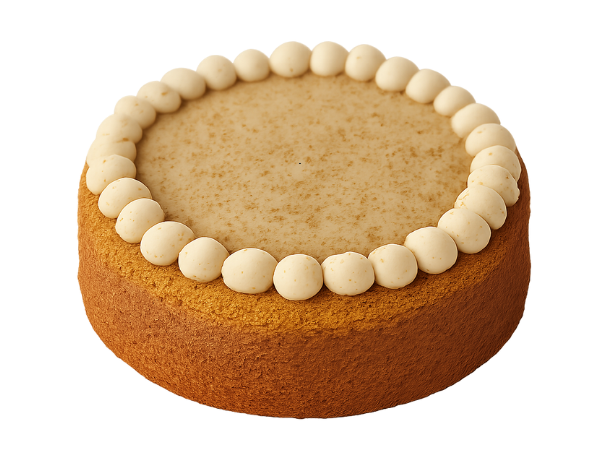
Cardamom Cake
Caffeine
0–20 mg
Note: Cardamom itself is naturally caffeine‑free. Any caffeine in Cardamom Cake comes only from added ingredients such as cocoa powder, chocolate, or brewed coffee. Recipes without these additions contain 0 mg caffeine, while chocolate or coffee variations may contribute small amounts.
| Attribute | Value |
|---|---|
| Caffeine Level | Very Low |
| Serving Size | 70 – 100 g slice |
| Caffeine | 0–20 |
| Calories | 280 – 350 kcal |
| Sugar | 20 – 28 g |
Cardamom Cake is a fragrant dessert that blends the warm, spicy notes of cardamom with a soft cake texture. While cardamom itself is naturally caffeine‑free, many recipes include cocoa powder, chocolate, or even coffee, which can introduce small amounts of caffeine.
What Is Cardamom Cake?
Cardamom Cake is a spiced dessert that has roots in Middle Eastern, Indian, and Scandinavian baking traditions. It is often enjoyed with tea or coffee and is prized for its aromatic flavor.
Key features of Cardamom Cake include:
- Spice Base – Ground cardamom seeds provide a warm, citrusy, and slightly minty flavor.
- Cake Texture – Typically soft and moist, similar to pound cake or sponge cake.
- Optional Add‑Ins – Some recipes include cocoa powder, chocolate chips, or coffee for depth.
- Cultural Variations – Scandinavian versions are often paired with coffee, while Indian versions may be richer and denser.
- Occasions – Served during holidays, celebrations, or as an everyday tea‑time treat.
Altogether, Cardamom Cake is more about flavor and aroma than caffeine, but its recipe variations can influence caffeine levels.
Nutritional Facts of Cardamom Cake
Cardamom Cake is calorie‑dense and provides energy mainly from carbohydrates and fats. The exact nutrition depends on the recipe, but a typical homemade slice (about 80–100 g) contains:
- Calories – 280–350 kcal
- Total Fat – 12–16 g
- Saturated Fat – 6–8 g
- Carbohydrates – 38–45 g
- Sugars – 20–28 g
- Protein – 4–6 g
- Sodium – 150–250 mg
These values show that Cardamom Cake is indulgent and best enjoyed in moderation. Its nutritional profile is similar to other spiced cakes, though the cardamom adds a unique aromatic twist.
Caffeine Content per 100 g of Cardamom Cake
Since cardamom itself is caffeine‑free, the caffeine content in Cardamom Cake depends entirely on whether cocoa, chocolate, or coffee is added.
Estimated caffeine per 100 g (depending on recipe):
- Plain Cardamom Cake (no chocolate/coffee) – 0 mg caffeine
- With cocoa powder (2–3 tbsp per cake) – 5–12 mg caffeine per 100 g
- With dark chocolate chips – 10–20 mg caffeine per 100 g
- With brewed coffee in batter – 15–25 mg caffeine per 100 g
Thus, a standard plain Cardamom Cake is caffeine‑free, but chocolate or coffee variations introduce small amounts.
Caffeine Content per Slice of Cardamom Cake
A slice of Cardamom Cake typically weighs between 70–100 g. The caffeine content will vary depending on the recipe.
Approximate caffeine per slice:
- Plain slice (no chocolate/coffee) – 0 mg
- Slice with cocoa powder – 4–10 mg
- Slice with chocolate chips – 7–15 mg
- Slice with coffee added – 12–20 mg
For comparison, a cup of brewed coffee contains ~95 mg of caffeine. This means even the richest chocolate‑coffee Cardamom Cake slice has far less caffeine than a single cup of coffee.
Factors That Influence Caffeine Levels in Cardamom Cake
Several recipe choices determine whether your Cardamom Cake has caffeine and how much.
Key factors include:
- Use of Cocoa Powder – More cocoa means higher caffeine.
- Type of Chocolate – Dark chocolate adds more caffeine than milk chocolate.
- Coffee Additions – Using brewed coffee or espresso in the batter significantly increases caffeine.
- Serving Size – Larger slices naturally contain more caffeine.
- Recipe Variations – Traditional versions are caffeine‑free, while modern adaptations may include stimulants.
Ultimately, Cardamom Cake is not considered a high‑caffeine dessert. Its caffeine content is minimal unless chocolate or coffee is deliberately added.
